LAHORE | Indian children belonging to the Seeds of Peace family returned home on Saturday by Dosti Bus with tons of warmth, hospitality and sweet memories. There were 21 boys and girls aged between 15-17 with two delegation leaders, Monica Wahi and Feruzun Mehta from India.
The US representative of Seeds of Peace organisation, Marieke van Woerkom, accompanied Indian children along with two Harvard University students, Anila (Pakistani) and Meenakshi (Indian). All the children hailed from Mumbai’s middle and upper society. They travelled by air to New Delhi from where they came to Lahore by Dosti Bus.
Seeds of Peace (SOP) is an American NGO which facilitates friendships among children of conflicting nations of the world. The idea of SOP was envisioned by John Wallach, a journalist who was moved by Mideast violence. The great luminary of world peace died of cancer in July 2002 among his worldwide family of Seeds of Peace children. He founded Seeds of Peace in 1993 and kept organising their get-together sessions in the idyllic haunts of Otisfield, Maine. In each session, he invited about 360 children in batches from rival nations including Pakistan and India.
Seeds of Peace is now being run by Aaron Miller, a friend of John Wallach, who shared his vision also.
The event of Indian children visiting Lahore was a low-key, off-media affair mainly because of security reasons and fear of ticklish questions of newsmen. All Indian children lived here with families of host children, the first ever free-will interaction between Indian Hindu families and Pakistani Muslim families after Partition. In that respect, it meant much more than sheer lip service to the cause of peace.
Asked what they enjoyed most in Pakistan, Indian children just had one word, “Hospitality” on their lips.
In the absence of any government level efforts, the children became true harbingers of peace, love and fraternity. The Indian children brought dainty gifts of choice and letters from their parents for host families. Indian parents used “Asalam-o-Alaikum” and “Insha Allah” in their letters for the first peace harvest after more than half a century.
Enthusiastic host children also pooled in funds for making organised visits to some of the best places of the city. In a chartered bus, they were taken to Government College University, Gurdawara adjacent to Badshahi Mosque, Gymkhana Club, Lahore Fort and Minar-e-Pakistan. They were feted at Village Restaurant, Cafe Zouk and Cocoo’s Cafe. Host families also served special dinners for the guests, keeping in view that many were pure vegetarians or half vegetarians.
Apart from hospitality, they said foods of Lahore were the most enjoyable part of their trip. Host boys took care of boy guests and host girls looked after Indian girls. They played together, ate together and lived together despite limited availability of time as a first experience of its kind.
The children had already been together in the SOP camps in the US, knew each other well and had been keeping their friendship alive on Internet. In their casual chats, India and Pakistan children discussed many of the big issues including Kashmir without getting embroiled, sending a silent message to their national leaders to emulate them.
Seeds of Peace had requested both Governor, Punjab Lt. Gen. Khalid Maqbool and Chief Minister, Punjab Chaudhry Pervaiz Elahi, for a photo session with SOP children. Ironically, however, both of them failed to respond.
Indian children were interesting observers as well. On August 14 they went round the town. They noted that Pakistanis celebrate Independence Day with a greater joy and spirit.


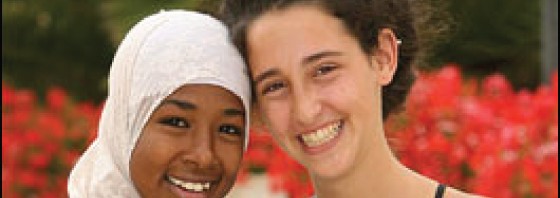
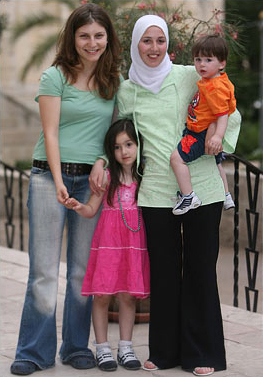 Israeli Noa Epstein, 24, met Palestinian Sara Jabari at a Seeds of Peace camp in 1997. They became pals and even made the dangerous trip to one another’s homes—risking jail in the occupied territories.
Israeli Noa Epstein, 24, met Palestinian Sara Jabari at a Seeds of Peace camp in 1997. They became pals and even made the dangerous trip to one another’s homes—risking jail in the occupied territories.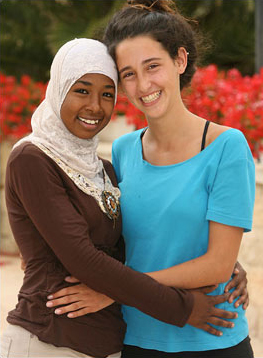 ISRAELI Hamutal Blanc, 16, from Haifa formed a firm friendship with Palestinian Amani Ermelia, 17, at a Seeds of Peace camp in June 2005. Amani lives in a refugee camp in Jericho.
ISRAELI Hamutal Blanc, 16, from Haifa formed a firm friendship with Palestinian Amani Ermelia, 17, at a Seeds of Peace camp in June 2005. Amani lives in a refugee camp in Jericho.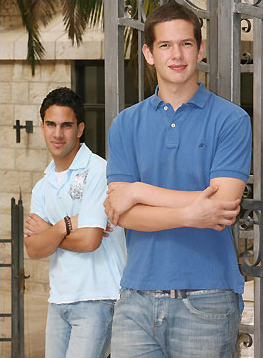 PALESTINIAN Mahmoud Massalha, 16, is from north Jerusalem. He made friends with Israeli Amos Atzmon, 16, of west Jerusalem, at a Seeds of Peace camp last year.
PALESTINIAN Mahmoud Massalha, 16, is from north Jerusalem. He made friends with Israeli Amos Atzmon, 16, of west Jerusalem, at a Seeds of Peace camp last year.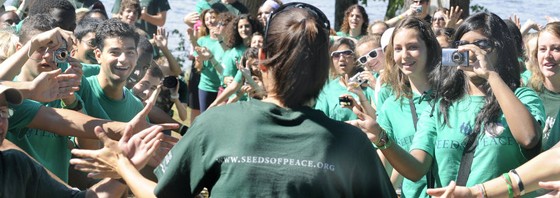
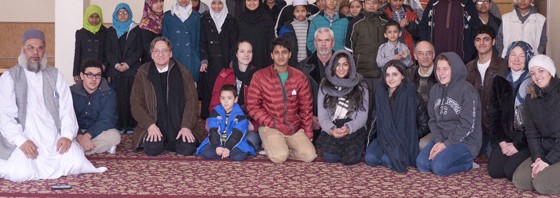
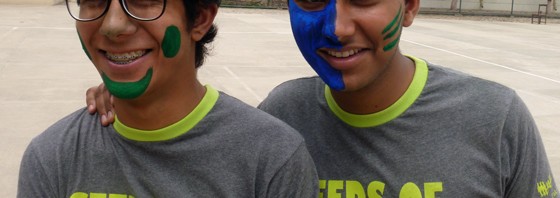
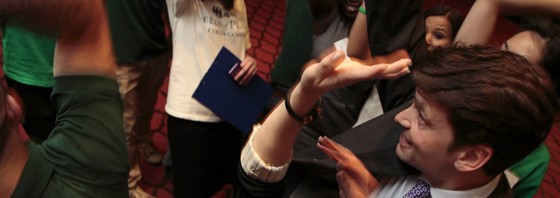



 After the end of their camp session in July, the delegation of Indian and Pakistani Seeds traveled to Washington D.C to discuss the issues facing both countries and the possibility of peace. Their trip included a reception at the Department of State where they were welcomed by Deputy Secretary of State John Negroponte and Assistant Secretary Richard Boucher.
After the end of their camp session in July, the delegation of Indian and Pakistani Seeds traveled to Washington D.C to discuss the issues facing both countries and the possibility of peace. Their trip included a reception at the Department of State where they were welcomed by Deputy Secretary of State John Negroponte and Assistant Secretary Richard Boucher. Seeds Café this month hosted television and newspaper journalists for a revealing discussion about the role of the media in the Israeli-Palestinian conflict. The guest speakers for this Seeds Café were CNN Producer Nidal Rafe and Yoav Stern, Ha’aretz newspaper’s Arab Affairs Correspondent. The audience had an opportunity to hear what happens behind the scenes of the media covering the conflict on a day-to-day basis. They addressed the difficulty of having positive stories run in the press and the importance of having local journalists covering events in the region.
Seeds Café this month hosted television and newspaper journalists for a revealing discussion about the role of the media in the Israeli-Palestinian conflict. The guest speakers for this Seeds Café were CNN Producer Nidal Rafe and Yoav Stern, Ha’aretz newspaper’s Arab Affairs Correspondent. The audience had an opportunity to hear what happens behind the scenes of the media covering the conflict on a day-to-day basis. They addressed the difficulty of having positive stories run in the press and the importance of having local journalists covering events in the region. Please take a moment and help support Seeds of Peace in a simple way—that’s totally free! Seeds of Peace is entered in the American Express Members Project. If everyone clicks on the link below and nominates our project, you could Help Seeds of Peace Win $1,5000,000! All you have to do is click! Every vote counts and the winner receives a $1.5 million grant. Runners up receive between $100,000-$500,000 each!
Please take a moment and help support Seeds of Peace in a simple way—that’s totally free! Seeds of Peace is entered in the American Express Members Project. If everyone clicks on the link below and nominates our project, you could Help Seeds of Peace Win $1,5000,000! All you have to do is click! Every vote counts and the winner receives a $1.5 million grant. Runners up receive between $100,000-$500,000 each!